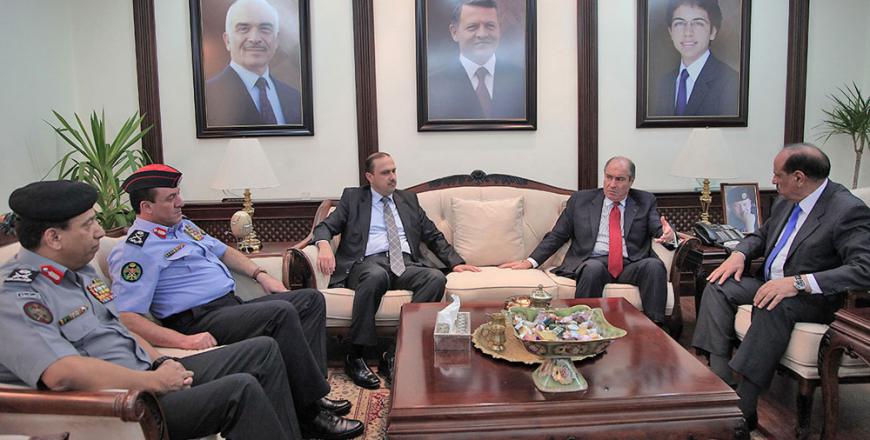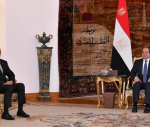You are here
Gov’t gearing up to implement decentralisation plan
By JT - Jul 11,2016 - Last updated at Jul 11,2016

Prime Minister Hani Mulki meets with top officials and security agencies’ chiefs at the Interior Ministry on Monday (Petra photo)
AMMAN — The decentralisation project embraces the participation of all state institutions in each governorate by providing citizens an opportunity to partake in planning their future and determining their priorities, Prime Minister Hani Mulki said Monday.
The premier made his remarks as he chaired a meeting at the Interior Ministry to discuss preparations for applying the decentralisation project and holding elections of governorate councils slated for next year, the Jordan News Agency, Petra, reported.
The practice nowadays is that planners, who might be unfamiliar with the targeted area, build their work strategies on what they think locals want, Mulki said. The decentralisation scheme will change that, he said, because the planning process will reflect what is really needed, as residents of the district in question will be in charge of decision making.
Decentralised planning is not merely about applying an executive policy, but it is rather a process that starts from the grassroots up to the decision-making centres, where decisions are made in response to citizens’ priorities in their respective locations, he added.
The premier stressed the government’s commitment to completing all the necessary regulations to apply decentralisation before next September.
The Decentralisation Law was endorsed by the outgoing Parliament and His Majesty King Abdullah has directed the government of Mulki to enact the by-laws and instructions necessary to put the law into effect.
Citizens have the right to see their aspirations met as long as the needed funds are available, he said, stressing that saving should be in current expenditure rather than capital expenditure that is directed to serving the people, Petra reported.
There are three procedures to follow while applying decentralisation: The first is raising the awareness on the jurisdiction and powers of governorate councils and the other provisions of the Decentralisation Law that the public needs to understand, the prime minister said.
The second is to identify the administrative procedures for executive work, while the third is to prepare for elections without having any conflicts among election procedures, Mulki added.
Interior Minister Salameh Hammad said that the draft by-law of distributing the election constituencies of governorate councils had been referred to the Cabinet, and stakeholders finished identifying administrative, technical, logistic, technological and training requirements.
He added that the ministry asked all governors to allocate plots of land to build the headquarters of governorate councils, adding that the Ministry of Public Works and Housing will check on the choices made.
Regarding the training of governors and the ministry’s employees, he said his ministry had provided the Ministry of Public Sector Development with a plan that includes nationwide training programmes and dispatching employees to get acquainted with other countries’ expertise in this field.
As for the next parliamentary elections, to be held on September 20, Hammad said the ministry was extending all necessary help for the Independent Election Commission, noting that governors and district directors visited polling centres and provided the commission with reports on their visits.
The ministry, through the public security and gendarmerie departments, also prepared a security plan to guarantee smooth and trouble-free elections.
Related Articles
AMMAN — The date for conducting the municipal and governorate council elections will be set within a month, but preparations to hold them ar
AMMAN — The Council of Ministers on Thursday approved a by-law that regulates the work of the governorate councils and identifies the proced
AMMAN – Interior Minister Salameh Hammad on Tuesday chaired a meeting to discuss the executive framework of the Decentralisation Law, the Jo















